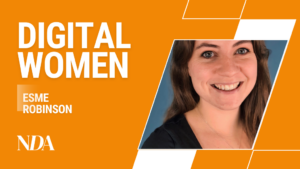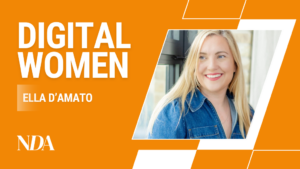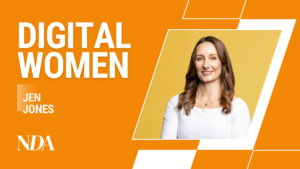NDA’s Digital Women series is talking to leaders from across our industry to understand the particular issues faced by women. Next up is Reem Al-Basri, Head of Digital Media Strategy, Theorem Inc.
What is the biggest opportunity for women in your sector of the digital industry today?
The diversity of the human experience is a wonderful benefit to every business. The differences in people mean that everyone brings unique strengths, varying methods of analytical thinking, problem solving not to mention creativity to any role.
A lack of confidence is a mindset that affects many women. Being comfortable with any feelings of vulnerability and taking the time to continuously expand your knowledge and learn from other experiences whilst being empathetic and candid in your communications goes a long way to building relationships with people – and it is these relationships that are the biggest opportunity for women in the digital industry.
Similarly, showcasing your expertise with trusted supporters not only builds personal confidence but inspires others confidence in you. It is not dissimilar to a marketing campaign – build long term relationships by remaining approachable in your expertise and leading by example and your advocates will multiply exponentially.
That being said, there is an argument for women to be more bullish in their search for recognition. Owning your expertise and claiming your place in senior leadership roles for example does not have to be at the expense of others. Women have the power to be bold and fair when it comes to securing opportunities in the digital industry today.
What is the biggest challenge to you as a woman in the digital industry and how are you overcoming it?
The biggest challenge to me is the fast paced nature of the digital industry. The legacy of COVID is undoubtedly the speed at which digital transformation has skyrocketed and the way in which we engage with brands and audiences has changed as a result.
This coupled with emerging tech such as AI that are now becoming accessible commodities to everyone, in the form of ChatGPT for example, means that there is a continuous shift in the nuances of how digital technology affects our industry. We have increasingly busy lives and there is a wealth of information to digest in order to stay up to date and remain competitive.
Perhaps unsurprisingly I find engaging with online content such as podcasts or social media allows me to keep abreast of the most up to date news and opinions. I also find networking with like minded industry peers is essential for the learning and sharing of novel ideas and processes.
What three things could employer companies do to make the digital industry better for women?
- Training and Development Programmes: Women must be involved in initiatives that can help them grow knowledge faster by learning concepts in action. Employers must promote mentoring or job shadowing and allow women time within their role to study or attend conferences and training programs.
- Flexible Work Environment: Women do tend to do the majority of the childcare in families and so allowing, if not supporting, women to work flexibly will eliminate a huge barrier to success in any industry. Indeed promoting flexible working regardless of gender takes the pressure off families in general as the household and parental responsibilities are shared.
- Gender Equality Policies in Action: Companies that promote highly inclusive and diverse work cultures, equal employee benefits and equal representation in leadership roles empower women to feel valued, enjoy their work and increase productivity. In general a nurturing and supportive workplace culture fosters innovation, and encourages employees to contribute their best efforts leading to a thriving working environment.
What support structures and organisations are most important and effective to you as a woman in the digital industry?
The most important support structure for women is to give her a voice in the digital world. Starting with the general advancement of opportunities for girls to participate in digital technology and innovation engagements at a young age. Industry led initiatives to encourage accreditations, certifications and committees to promote women’s digital capabilities and knowledge, in addition to accelerating skill building for women in digital and technology roles.
At a company level, developing watertight equality policies and truly addressing the gender gap with diversity and inclusivity in the digital work space ensuring equal opportunities for women in the industry in an ongoing way. Setting up steering groups, mentoring and encouraging participation in industry trade, conferences, and events to allow women to stay on the cutting edge of their roles.
What is the biggest misconception about women and by women in the digital industry?
A huge misconception in the digital industry is assuming that women are not interested. A lack of awareness of the industry at grassroots level has led to less outreach and support for women later on in their careers. This vicious cycle has promoted a self propagating lack of diversity in the workforce.
This is perhaps a result of a skills gap in traditional teaching methods but if girls had access to a more digital education at a younger age it would undoubtedly fuel a new generation of female digital leaders.
That being said, there is a huge diversity of roles in the digital industry from those that require deep technical expertise to those that might require a working understanding of technological concepts. Women should not be discouraged from striving for a career in the digital industry if they feel they are not technically minded, the digital industry thrives on the meeting of many different creative and technical minds – it takes a village!












